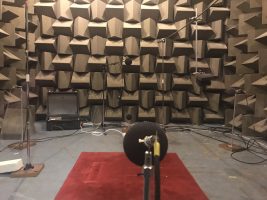From creating almost silent car engines and soft closing doors to learning how humans hear, the University of Salford’s Acoustic Centre has been at the forefront of revolutions in sound.
Now it is celebrating its 60th birthday and Dhanna Estinozo has been given exclusive access to the specially designed sound laboratories.

Trevor Cox, Professor of Acoustic Engineering in the University of Salford, said the biggest change in acoustics over the past six decades has been the computer.
“If you go back 60 years and you talk about the late 50’s. There were computers from the search laboratories, which were big great machines that ran very slowly, but now most scientist spend a lot of their time sat on computers.
“We carry in our mobile phones much more computing pads that was available back then, and that’s changed things. So when we designed a console in acoustics, we reached for a computer model.
“We don’t reach for a physical model, where we make models of actual consoles. We now virtually design things on the computer.”
Nikhilesh Patil, a PhD student within the University, took me to into the laboratories; listen to what it was like in the most quietest room in the country.
The University of Salford is one of the three Universities that offer a degree in acoustic, the other being in Southampton.
Acoustics and audio research has been conducted at Salford since before 1965.
The acoustics laboratories were completely rebuilt in 2005 at a cost of £2.5M. They include a listening room, reverberation rooms, three anechoic chambers, an accredited calibration laboratory and state of the art equipment and instrumentation.
Trevor Cox goes on to explain that through the laboratories, they are able to bring much of the fundamental research into real life applications.
[pullquote]”We don’t reach for a physical model, where we make models of actual consoles. We now virtually design things on the computer” – Trevor Cox [/pullquote]
“I think we have revolutionised acoustics in several ways. One if which is education. We have hundreds of people working in the acoustics industry that we have educated over the years.
“If you go to an acoustic conference or an acoustic meeting you will bump into lots of graduates from Salford who have now been doing it for so long they are top directors with big companies.
“I think we have had a big educational influence. If you wander round an environment you will find lots of products we have tested.”














Recent Comments